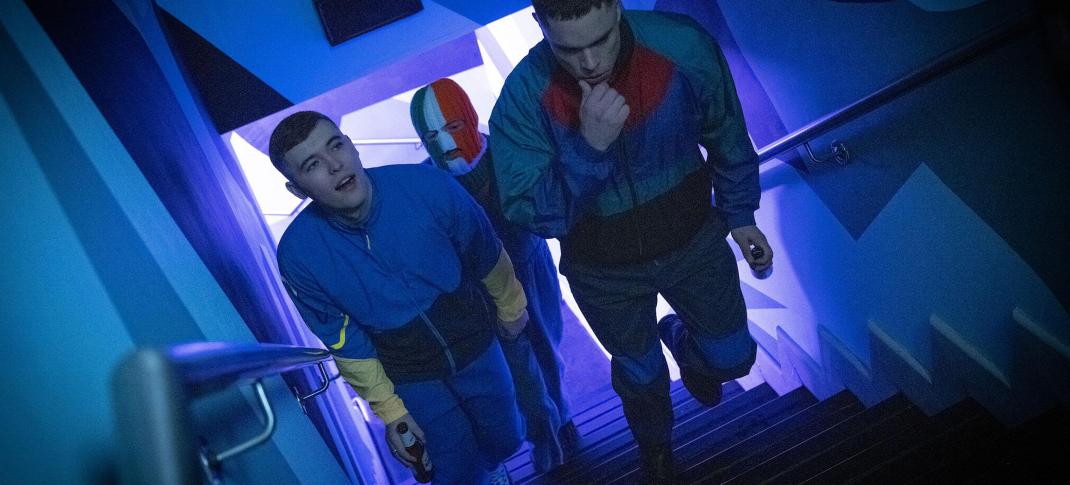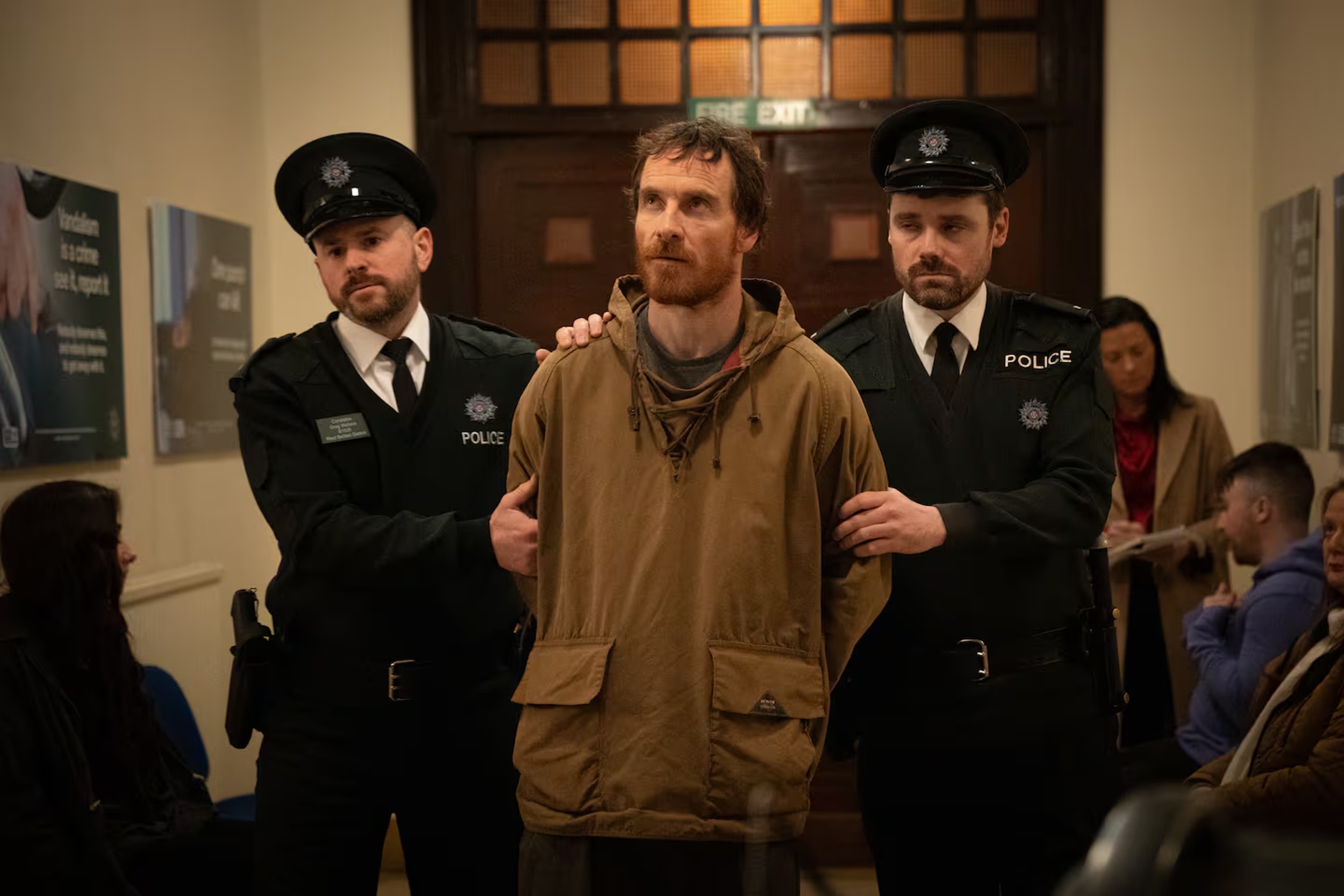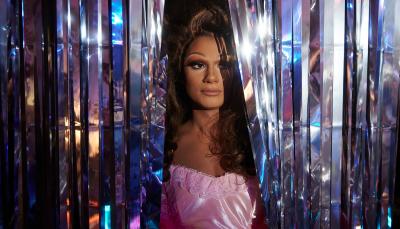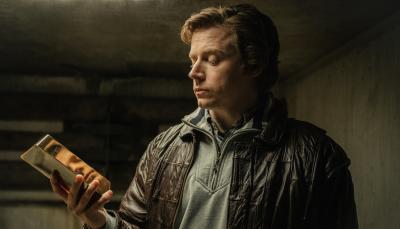'Kneecap' Is Here to Hit You Where it Matters

Liam Óg "Mo Chara" Ó Hannaidh, Naoise "Móglaí Bap" Ó Cairealláin, and JJ "DJ Próvaí" Ó Dochartaigh as themselves in 'Kneecap'
Sony Pictures Classics
Kneecap, an Irish-language hip hop trio from West Belfast, have exploded over the past seven years with pounding, hedonistic rave and house tracks, all born from a young, culturally-specific Northern Irish perspective. Historically, rap has always used language in an explicitly political way – the global appeal of the genre’s emphatic, urgent, and rhythmic compositions means rap has been adopted by underground communities and marginalized voices all across the world who perform incisive and riotous numbers that invigorate (and potentially radicalize) their audience. At its core, it’s a tool to shake us awake and demand recognition in your own political sphere.
The group uses Irish, the endangered language also known as Gaelic, to demand attention in a culturally contested space. If sectarian and unionist forces seek to politicize and sequester the Irish, Kneecap’s aim is to keep it vital and growing. Their satiric hip-hop accounts of partying through West Belfast resonate with a generation growing up in the wake of the Good Friday Agreement, who resist how history defines modern Northern Irish identity.
Their group was formed after they refused to talk to the police in anything but Irish; the cursing and drug references in their songs got them banned by radio stations and condemned by unionist politicians; their name refers to the violent punishment dealt out by paramilitary Irish Republicans. A challenged political status is baked into the band’s blood, and it’s all down to band members Mo Chara, Móglaí Bap, and DJ Próvaí that Kneecap, the fictionalized account of the band’s early days, has enough of a fiery, whipsmart energy.
Appearing as themselves, Mo Chara (real name, Liam Óg Ó Hannaidh), Móglaí Bap (Naoise Ó Cairealláin), and DJ Próvaí (JJ Ó Dochartaigh) face the challenge of not only capturing the energy of their discography in non-gig scenes but also carry dramatic arcs (all three share writing credits with director Rich Peppiatt). Each band member works through their own drama throughout the film, starting with Móglaí Bap, who wrestles with his distant IRA member father, Arlo Ó Cairealláin (Michael Fassbender). The elder Cairealláin faked his death (hence the distance); however, he still tries to steer his son’s resistance through Indigenous language from afar.
Mo Chara’s republican Catholic upbringing clashes with Georgia (Jessica Reynolds), the dominatrix Protestant he starts sleeping with (admittedly, this is way more comedic than the others). Meanwhile, DJ Próvaí, the oldest of the group, is an Irish teacher who sees the boy’s musical prowess as a way to escape the drudgery of his professional life and marriage.
Kneecap works as well as it does because these three unprofessional actors are so commanding; what they lack in acting finesse, they make up for with sparking energy, ferocity, and comic timing. Not all of these dramatic plotlines cohere as much as the film wants them to – the only one with real stakes is Próvaí’s, and the resistance the band faces from drug-dealing gangs and anti-republican police officers is a little too broadly sketched to feel like a real threat. There’s no doubt that Kneecap faced severe obstacles in their hometown as their music expanded through Ireland. However, something about how Peppiatt packages this version of Kneecap’s story strips it of the urgent, reactive edge that it needs.
The boys often narrate our journey into their world, and Peppiatt tries to match the propulsive tenor of their speech and music. However, the film relies on overediting scenes and applying on-screen graphics that undercut the uniqueness of Kneecap’s voice. The souped-up production value hints at the film knowing it needs a visual style but being unable to think of one that doesn’t scream “STYLE” in big capital letters. There’s no real visual texture, no proper underground sensibilities to the craft; as the more rote beats in the rise-to-fame biopic narrative are hit, the singularities of why Kneecap exploded feel compromised by overproduced, conventional filmmaking.
Some intrusions of strange style are welcome – like a delightful claymation “bad trip” sequence just before a gig – but when you see amateur footage of their real gigs after watching one unfold in the film’s climax, it’s clear the movie hasn’t captured the feral immediacy of witnessing them perform.
Kneecap ultimately feels like a collection of fun, provocative, and stirring ideas that only truly cohere because Mo, Móglaí, and DJ Próvaí are on screen, shaking empty pubs to life with their tunes, dropping as many generational trauma buzzwords to get their hands on prescription medication, or sabotaging sectarian Orange Order marches. However, the most stirring and central idea of the film is a mockery of the concept of “ceasefire babies” and the enforced passivity and acceptance such a title implies. It’s a film that resists passivity, about a band that uses live, flowing language to keep a language alive and flowing. It holds tightly enough to Kneecap’s trailblazing coattails to win us over.
Kneecap is the official selection for Ireland's entry in the 2025 International Feature Film category for the 97th Academy Awards. The film started playing in limited release in the U.S. starting Friday, August 2, 2024, and is expected to widen in the coming weeks.





